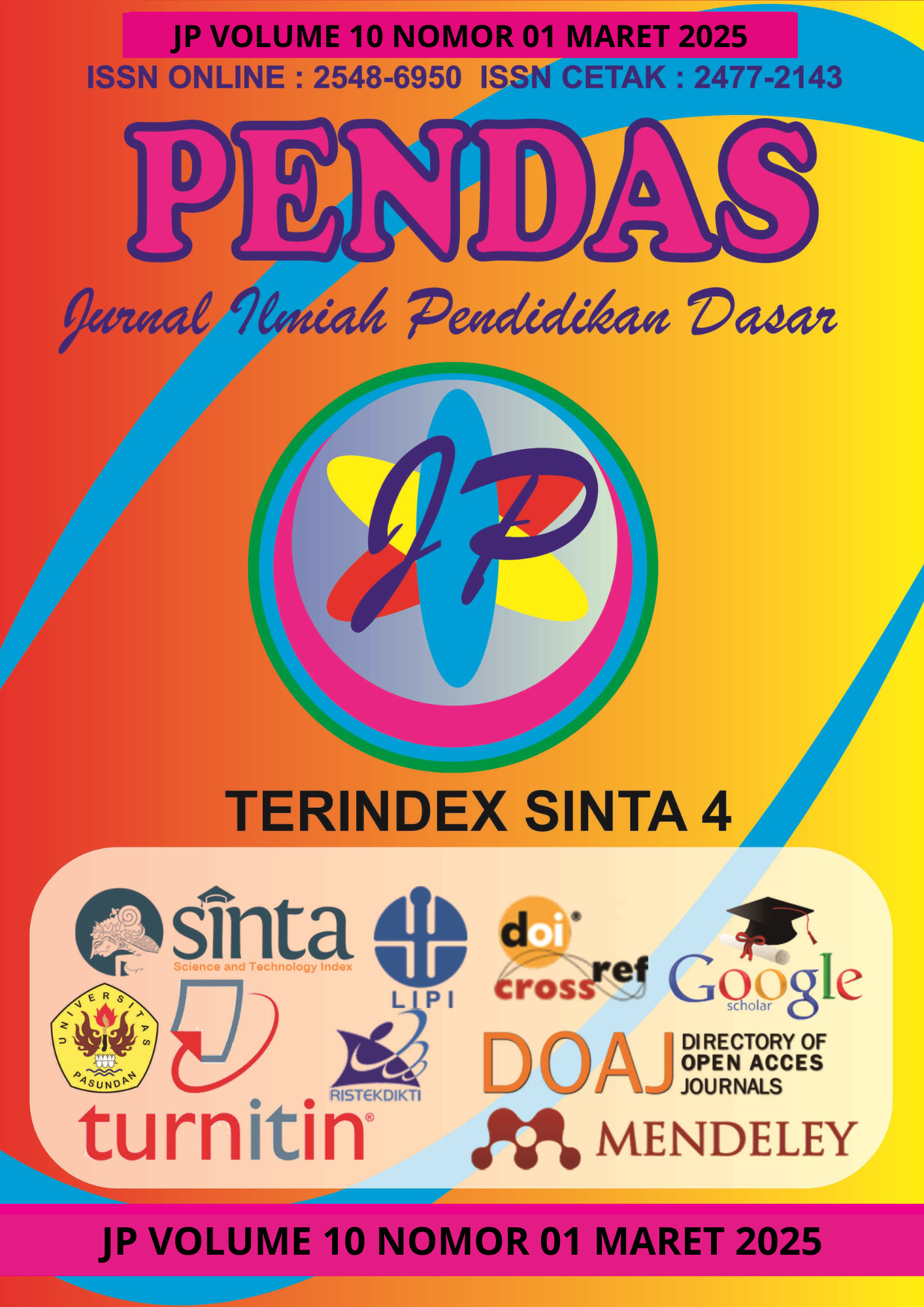ANALISIS LINGKUNGAN KELUARGA DISHARMONIS DITINJAU DARI HASIL BELAJAR IPAS SISWA SEKOLAH DASAR
DOI:
https://doi.org/10.23969/jp.v10i01.23056Keywords:
Family Environment, Disharmonious Family, Social Sciences Learning OutcomesAbstract
This study aims to analyze the disharmonious family environment in terms of the high social studies learning outcomes of fourth-grade students of SDN Tondokerto,. The family environment is divided into two, namely harmonious and disharmonious families. A disharmonious family is a condition in which a family cannot carry out its role properly. A disharmonious family has six indicators including spiritual crisis, lack of family knowledge, egocentrism, educational problems, busyness problems, and economic problems. This study is included in the type of qualitative phenomenological research. The subjects in this study were 1 of 18 fourth-grade students of SDN Tondokerto. One student who is a student who has high learning outcomes but lives in a disharmonious family. Data collection techniques used include observation, documentation, and interviews. The validity of the data in this study uses the degree of trust (credibility). Credibility testing is carried out using source triangulation and technique triangulation. Data analysis in this study uses the Miles and Hubberman model which contains data reduction, data presentation, and data conclusions. The results of the study showed that indicators in disharmonious families affect the results of learning science at SDN Tondokerto. AIS is a student who lives in a disharmonious family. However, he has a high enthusiasm for learning and does not pay attention to the shortcomings in his family, so that the results of learning science he obtains are also high. It can be concluded that indicators in disharmonious families affect the results of learning science at SDN Tondokerto. The good or bad impact felt depends on the treatment and how students and parents respond to these indicators.
Downloads
References
Amalia, A., Sucipto, & Hilyana, F. S. (2022). Konsentrasi Belajar Siswa Pada Mata Pelajaran IPA. Jurnal Educatio, 8, 1261-1268.
Aufa, M. R., Kironoratri, L., & Fardani, M. A. (2023). Peranan Pembiasaan Ibadah dalam Pengembangan Karakter Religius Siswa di SD Muhammadiyah 1 Kudus. Didaktik : Jurnal Ilmiah PGSD FKIP Universitas Mandiri, 9, 1339-1348.
Azzahra, R., Fitriani, W., Desmita, & Warmansyah, J. (2022). Keterlibatan Orang Tua di Minangkabau dalam PAUD pada Masa Pandemi Covid-19. Jurnal Obsesi : Jurnal Pendidikan Anak Usia Dini, 6, 1549-1561.
Desmaniar, I., Harapan, E., & Kesumawati, N. (2020). Pengaruh Penggunaan Teknologi Informasi dan Komunikasi Antar Pribadi Terhadap Hasil Belajar Siswa. Cahaya Pendidikan, 6, 79-93.
Dewi, P. F., Setiawan, D., & Fardani, M. A. (2021). Pelaksanaan Pendidikan Karakter Disiplin Anak di Lingkungan Keluarga Buruh Konveksi di Desa Guwosobokerto. JIP Jurnal Inovasi Penelitian, 2, 1187-1194.
Fadhilah, N., & Mukhlis, A. M. (2021). Hubungan Lingkungan Keluarga, Interaksi Teman Sebaya dan Kecerdasan Emosional dengan Hasil Belajar Siswa. Jurnal Pendidikan, 22, 15-31.
Lubis, J., Sintiya, Lestari, S., & Khadijah. (2022). Pola Asuh Orangtua Dalam Mengembangkan Karakter Anak Usia Dini. urnal Pendidikan dan Konseling, 4, 2080-2089.
Maharani, I., Setiawan, D., & Fardhani, M. A. (2023). Peran Orang Tua pada Pembelajaran Daring di Masa Pandemi dalam Meningkatkan Kualitas Belajar Siswa Kelas 1 SD N Sarimulyo 02. COLLASE Creative of Learning Students Elementary Education, 6, 53-59.
Melati, R. S., Ardianti, S. D., & Fardani, M. A. (2021). Analisis Karakter Disiplin dan Tanggung Jawab Siswa Sekolah Dasar pada Masa Pembelajaran Daring. Edukatif: Jurnal Ilmu Pendidikan, 3, 3062 - 3071.
Muiz, A., Sukandar, A., & Insan, H. S. (2022). Pembiasaan Berdo’A Sebelum Belajar dalam Meningkatkan Kecerdasan Sikap Spiritual (Studi Deskripsi di Madrasah Aliyah Cilenga dan Madrasah Al-Hamidiyah Cipancur Kabupaten Tasikmalaya). Edukatif, 8, 49-62.
Nadhifah, I., Kanzunnudin, M., & Khamdun. (2021). Analisis Peran Pola Asuh Orangtua Terhadap Motivasi Belajar Anak. Jurnal Educatio, 7, 91-96.
Nisak, H., Masfuah, S., & Hilyana, F. S. (2024). Meningkatkan Hasil Belajar IPAS Siswa Kelas IV SD Melalui Model Pembelajaran Mind Mapping Berbantuan Media VINTAMI. Jurnal Ilmiah Profesi Pendidikan, 9, 1758-1767.
Nurtjahjani, F., Aini, Y. N., Novitasari, A. F., & Basuki, S. (2021). Implementasi Membangun Keluarga Harmonis Untuk Menurunkan Tingkat Stres Ibu PKK RW 21 Purwantoro Malang. Reswara : Jurnal Pengabdian Kepada Masyarakat, 2, 178-185.
Prasetya, A., Hilyana, F. S., & Kuryanto, M. S. (2023). Hubungan Motivasi Belajar Terhadap Hasil Belajar Siswa Kelas IV SD 1 Mijen Kaliwungu Kota Kudus. Pendas : Jurnal Ilmiah Pendidikan Dasar, 8, 5052-5061.
Sadida, S., & Septiyana, R. (2025). Analisis Cerpen “Nyaris Broken Home” Karya Rora Rizki Wandini Kajian Psikoanalisis Sigmund Freud. Jurnal Vokatif : Pendidikan Bahasa, Kebahasaan dan Sastra, 2, 20-29.
Salsabila, S. N., Hilyana, F. S., & Sumaji. (2022). Analisis Perhatian Orang Tua Terhadap Prestasi Belajar Matematika Siswa Kelas VI SD Negeri 2 Gondoharum. Jurnal Ilmiah Pendidikan Matematika, 7, 1-13.
Saputra, S., Suryani, K., & Pranata, L. (2021). Studi Fenomenologi : Pengalaman Ibu Bekerja Terhadap Tumbuh Kembang Anak Prasekolah. Indonesian Journal Of Healath and Medical, 1, 151-163.
Saputro, K. R., Ulya, H., & Fardani, M. A. (2021). Pengaruh Perhatian Orang Tua Selama Pembelajaran Daring Terhadap Prestasi Belajar Siswa SD 2 Karangrowo. Jurnal Prasasti Ilmu, 1, 1-7.
Setyoningsih, S., Ratnasari, Y., & Hilyana, F. S. (2023). Peran Orang Tua Dalam Menanamkan Sikap Disiplin dan Tanggung Jawab Belajar Pada Anak SD. Jurnal Educatio, 9, 1160-1166.
Simamora, T., Harapan, E., & Kesumawati, N. (2020). Faktor-faktor Determinan yang Mempengaruhi Prestasi Belajar Siswa. JMKSP Jurnal Manajemen, Kepemimpinan, dan Supervisi Pendidikan, 5, 191-205.
Sundari, Y., & Ritonga, Z. S. (2020). Hubungan Keharmonisan Keluarga Terhadap Hasil Belajar Siswa SDN 060929 Medan Johor. Jurnal Pendidikan dan Kependidikan, 5, 1-8.
Downloads
Published
Issue
Section
License
Copyright (c) 2025 Pendas : Jurnal Ilmiah Pendidikan Dasar

This work is licensed under a Creative Commons Attribution 4.0 International License.














































